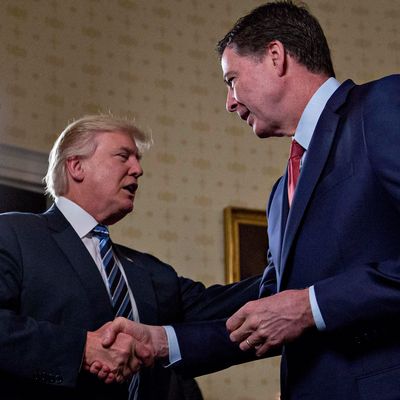
White House senior adviser Kellyanne Conway appeared on Good Morning America Friday morning and in an interview most notable for her refusal to confirm that President Trump believes in global warming, she dropped a potential bombshell: President Trump might stop James Comey from testifying to Congress next week.
More precisely, she said President Trump “will make that decision,” when asked if he would invoke executive privilege in an attempt to prevent the former FBI director’s planned testimony to the Senate Intelligence Committee.
If it wasn’t obvious that she was leaving the door open for Trump to make such a claim, Sean Spicer cleared up any doubt at Friday’s press briefing.
As we wait to see if Trump invokes executive privilege, it’s worth asking if it would even have the desired effect of muzzling Comey. The president does have the power to withhold information, including conversations between himself and other members of the Executive branch, from Congress. It’s not in the Constitution, but it’s an implied power that the courts recognize. But, as Mark Rozell, an expert on the subject, told ABC News, Trump would have to claim that it was in the public interest to prevent his discussions with Comey from going public.
“The president would have to make the case that if Comey divulges information, it would cause undue public harm by compromising national security or an ongoing investigation,” said Rozell, who literally wrote the book on executive privilege.
Since the conversations that interest Congress concern Trump’s attempt to pressure Comey into ending the investigation into Michael Flynn, it would be hard for Trump to make either of the above arguments.
Some have argued that Trump has already waived his right to claim executive privilege by speaking publicly about his conversations with Comey. Trump has made public details about the conversations in the publicly released letter firing Comey and in an interview with NBC’s Lester Holt.
“I said, ‘If it’s possible, would you let me know, am I under investigation?’ He said, ‘You are not under investigation,’” Trump told Holt.
None of these potential stumbling blocks would stop Trump from trying to claim executive privilege, but they could prevent him being able to. Ultimately, if Trump does try it, the issue would likely end up in the courts, where a judge would be forced to sort it all out. That would delay the proceedings, but most experts seem to think that Comey would eventually be allowed to testify.
Beyond the legal and procedural hurdles standing in the way of Trump claiming executive privilege, there is the issue of public opinion. Trump stepping in to put the kibosh on what is shaping up to be the Super Bowl of Senate testimonies would not look good.
There’s no better way to create the impression that you have something to hide, than by going out of your way to ensure that something stays hidden.





























